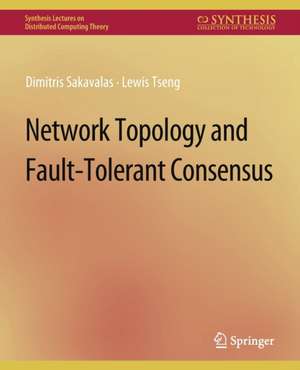Network Topology and Fault-Tolerant Consensus: Synthesis Lectures on Distributed Computing Theory
Autor Dimitris Sakavalas, Lewis Tsengen Limba Engleză Paperback – 13 mai 2019
We summarize studies on the topological conditions that determine the feasibility of consensus, mainly focusing on directed networks and the case of restricted topology knowledge at each participant. Recently, significant efforts have been devoted to fully characterize the underlying communication networks in which variations of fault-tolerant consensus can be achieved. Although the deduction of analogous topological conditions for undirected networks of known topology had shortly followed the introduction of the problem, their extension to the directed network case has been proven a highly non-trivial task. Moreover, global knowledge restrictions, inherent in modern large-scale networks, require more elaborate arguments concerning the locality of distributed computations. In this work, we present the techniques and ideas used to resolve these issues.
Recent studies indicate a number of parameters that affect the topological conditions under which consensus can be achieved, namely, the fault model, the degree of system synchrony (synchronous vs. asynchronous), the type of agreement (exact vs. approximate), the level of topology knowledge, and the algorithm class used (general vs. iterative). We outline the feasibility and impossibility results for various combinations of the above parameters, extensively illustrating the relation between network topology and consensus.
Din seria Synthesis Lectures on Distributed Computing Theory
- 20%
 Preț: 355.13 lei
Preț: 355.13 lei - 20%
 Preț: 228.61 lei
Preț: 228.61 lei - 20%
 Preț: 226.64 lei
Preț: 226.64 lei - 20%
 Preț: 362.65 lei
Preț: 362.65 lei - 20%
 Preț: 382.39 lei
Preț: 382.39 lei - 20%
 Preț: 386.68 lei
Preț: 386.68 lei - 20%
 Preț: 223.34 lei
Preț: 223.34 lei - 20%
 Preț: 334.71 lei
Preț: 334.71 lei - 20%
 Preț: 225.48 lei
Preț: 225.48 lei - 20%
 Preț: 299.81 lei
Preț: 299.81 lei - 20%
 Preț: 272.33 lei
Preț: 272.33 lei - 20%
 Preț: 228.80 lei
Preț: 228.80 lei - 20%
 Preț: 225.99 lei
Preț: 225.99 lei - 20%
 Preț: 227.12 lei
Preț: 227.12 lei - 20%
 Preț: 272.00 lei
Preț: 272.00 lei - 20%
 Preț: 271.34 lei
Preț: 271.34 lei - 20%
 Preț: 383.37 lei
Preț: 383.37 lei -
 Preț: 400.94 lei
Preț: 400.94 lei - 20%
 Preț: 240.23 lei
Preț: 240.23 lei
Preț: 384.03 lei
Preț vechi: 480.03 lei
-20% Nou
Puncte Express: 576
Preț estimativ în valută:
73.51€ • 79.87$ • 61.79£
73.51€ • 79.87$ • 61.79£
Carte tipărită la comandă
Livrare economică 21 aprilie-05 mai
Preluare comenzi: 021 569.72.76
Specificații
ISBN-13: 9783031008863
ISBN-10: 3031008863
Pagini: 129
Ilustrații: XXI, 129 p.
Dimensiuni: 191 x 235 mm
Greutate: 0.27 kg
Editura: Springer International Publishing
Colecția Springer
Seria Synthesis Lectures on Distributed Computing Theory
Locul publicării:Cham, Switzerland
ISBN-10: 3031008863
Pagini: 129
Ilustrații: XXI, 129 p.
Dimensiuni: 191 x 235 mm
Greutate: 0.27 kg
Editura: Springer International Publishing
Colecția Springer
Seria Synthesis Lectures on Distributed Computing Theory
Locul publicării:Cham, Switzerland
Cuprins
List of Figures.- List of Tables.- List of Algorithms.- Preface.- Acknowledgments.- Introduction.- Consensus and Network Topology.- Synchronous Crash Fault Tolerance.- Asynchronous Crash Fault Tolerance.- Byzantine Fault Tolerance.- Relay Depth and Approximate Consensus.- Broadcast Under Local Adversaries.- General Adversary.- Bibliography.- Authors' Biographies .
Notă biografică
Dimitris Sakavalas is currently a postdoctoral research fellow in the Computer Science department at Boston College. Previously, he has been a postdoctoral researcher at the Computation and Reasoning Laboratory of the National Technical University of Athens, Greece. He received his diploma (in Applied Mathematical and Physical Sciences), his M.Sc. (in Applied Mathematical Sciences), and his Ph.D. (in Computer Science) from the National Technical University of Athens, Greece, in 2009, 2012, and 2016, respectively. His research interests lie in the field of distributed computing, and range from complexity theory for distributed systems to fault-tolerant communication and agreement primitives as well as energy efficient wireless network protocols.Lewis Tseng is currently an assistant professor in the Computer Science department at Boston College. Before that, he spent a year and a half as a researcher at Toyota Info Technology Center. He received a B.S. and a Ph.D. both in Computer Science from the University of Illinois at Urbana-Champaign (UIUC) in 2010 and 2016, respectively. His research broadly lies in the intersection of fault-tolerant computing and distributed computing. Some recent research includes: (i) fault-tolerant primitives, such as broadcast and consensus, in directed and incomplete networks; (ii) scalable distributed shared storage systems that tolerate crash and Byzantine faults;and (iii) fundamental understanding of Blockchain-based systems.
